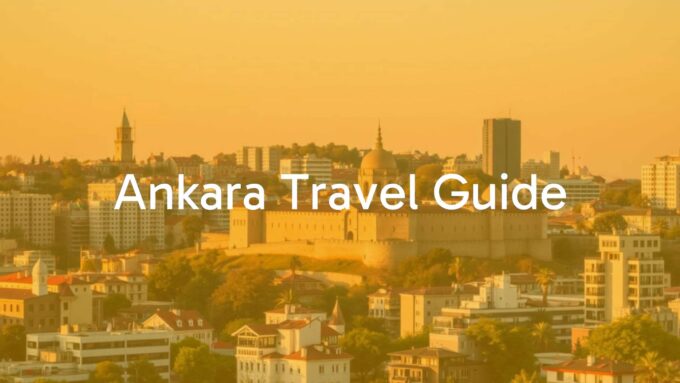Thinking about traveling alone? Turkey is a great choice! This unique country, sitting between Europe and Asia, is full of ancient sites, lively culture, and amazing scenery, all perfect for exploring on your own. Whether you’ve traveled solo before or are planning your first solo trip, you’ll find Turkey is very friendly and easy to get around. From Istanbul’s busy markets to the strange rock shapes in Cappadocia, and the calm blue beaches along the coast, there’s something for every traveler to discover at their own speed.

While some places can be tricky for solo visitors, Turkey usually feels easy and enjoyable to travel alone. The transportation is good, and locals are welcoming and willing to help-which means you’ll quickly settle in. You’ll get to enjoy local traditions, try delicious food, and make lots of memories, all on your own schedule. If you’re looking for a great solo adventure, Turkey could be the perfect place for you.
Why travel to Turkey alone?
Turkey is an excellent choice for solo travelers for many reasons. It has something for everyone, no matter what kind of trip you want. There’s a wide mix of things to see and do, along with a friendly atmosphere for people doing their own thing.
Interesting cultural experiences
Turkey is like a living museum, bridging East and West and keeping its long history alive. As a solo traveler, you can take your time exploring places like the ancient city of Ephesus, a UNESCO site rich with Greek and Roman history. Or, enjoy getting happily lost in Istanbul’s Grand Bazaar, full of colorful sights and smells. Turkey has 19 UNESCO sites, so there’s lots for history fans. Highlights include the Hagia Sophia and the Blue Mosque, each impressive in its own way. You can spend hours at these locations, taking it all in at your own pace.

More than famous monuments, small everyday moments are meaningful too. You might be invited for tea by a local shopkeeper, or have a nice chat with someone you meet. This mix of tradition and modern life keeps things interesting, and solo travelers will often notice how open and welcoming the culture is.
Famous hospitality and traditions
Turkish people are known for being kind and happy to help. If you’re traveling alone, this can make you feel welcome and safe, even when you’re far from home. Locals may offer you help or invite you for food or tea, making it easy to connect. Even the food traditions, like big Turkish breakfasts or communal hot baths (hammams), are a fun way to experience genuine Turkish life. Taking a cooking class, joining local festivals, or relaxing in a café gives you an even closer look at daily routines. Turkey makes it simple for solo travelers to dive into local culture.
Easy for solo travelers
Turkey is big, but getting around is simple. The bus network connects almost everywhere, and buses are modern and comfy. Domestic flights are cheap and quick between big cities, and places like Istanbul have easy-to-use public transportation like metros and ferries. You can buy an Istanbul Card for cheaper fares.
Most people working around tourist sites and large cities speak some English. Still, knowing basic Turkish greetings like “merhaba” (hello) or “teşekkür ederim” (thank you) is polite. Hostels in cities like Istanbul and Antalya give you a chance to meet other solo travelers and maybe share trips. Since the transportation and accommodation are well organized, it’s simple for solo travelers to plan their own trips without much hassle.
Is Turkey safe for people traveling alone?
Safety matters when you’re traveling on your own. Most solo travelers find Turkey to be safe, and people’s willingness to help often makes it more comfortable. Like anywhere, it’s smart to be aware of your surroundings, but most visitors feel at ease here.
General safety
Turkey is usually seen as safe for solo travelers, with low rates of petty theft compared to many big European cities. Pickpocketing can happen, but it’s not as common as in some other European destinations. Big city areas, especially in Istanbul, are lively almost all day and night, which adds a sense of security. Many solo travelers-even women-report feeling safe here, especially in busy areas and tourist spots.
To avoid problems, stick to well-lit places at night, watch your belongings in crowds, and don’t show off cash or expensive items. Rideshare apps like Uber are available in big cities and are a safe way to get home at night.
Tips for solo female travelers
Women traveling alone in Turkey usually have positive experiences, though you might sometimes get unwanted attention, like staring or flirty comments. Most of the time this isn’t threatening. To avoid problems, act confidently, don’t make eye contact if someone is bothering you, and dress modestly in less-touristy or rural areas (covering knees and shoulders is standard, and you’ll need a scarf for mosques). Trust your instincts-if you feel uncomfortable, walk away or say no politely. It’s wise to be cautious around overly chatty strangers who approach you for no clear reason, especially in touristy areas.

Common scams and how to avoid them
| Scam | What to do |
|---|---|
| Shoe-shine trick (vendor “drops” brush and asks for money after cleaning your shoes) | Just ignore the brush and keep walking. |
| Taxis overcharging (taking longer routes, giving fake prices) | Use the meter, agree on a price beforehand, or use taxi apps like Uber or Bitaksi. |
| Overpriced goods in markets | Haggle politely, as higher prices for tourists are common. |
| Over-friendly strangers leading you to a shop or restaurant and then giving you a big bill | Say no firmly and walk away if something feels off. |
Being careful and using basic travel sense can prevent most of these minor issues during your trip.
When is the best time to visit Turkey as a solo traveler?
The time of year you pick can really change your trip in terms of weather, prices, and crowds. The “shoulder seasons”-spring (March to May) and autumn (September to November)-are the best times for good weather, comfortable sightseeing, and fewer tourists. Prices for hotels and flights are also generally lower during these times.
Summer (June to August) is busiest, especially on the coast. It gets very hot inland, and sites can be packed, so book things in advance if you go in summer. Winter (December to February) is the slowest period, with lower prices but less activity, especially in beach towns, unless you’re interested in winter sports.
Festivals and events for solo travelers
- Religious holidays: Such as Eid (Şeker Bayramı and Kurban Bayramı), can be an interesting way to see local traditions, but some services may be limited.
- Cultural festivals: Istanbul and other cities hold music, art, and film events, mainly in spring and fall-great for meeting new people.
- Harvest celebrations: Especially in wine areas like Şirince.
- Nevruz: Spring festival around March 21, mostly in eastern Turkey.
Joining in on these activities is a good chance to meet locals and other travelers. The friendly mood helps even if you speak little Turkish.
How to get to and around Turkey on your own
Arriving: entry rules and visas
The fastest way into Turkey is by flying into either of the main airports in Istanbul (IST or SAW). Before your trip, check if you need a visa. Many visitors can use the easy e-Visa system-just make sure to use the official government site and avoid extra-fee third-party sites. Plan how you’ll get to your hotel from the airport-use public transport, pre-book a transfer, or consider getting a SIM card on arrival for maps and communication.
Getting around: buses, trains, planes, ferries
- Buses: Comfortable and common for long distances. They go to almost every city, and you can book tickets online or at bus stations.
- Planes: For bigger distances, domestic flights are cheap and fast. Turkey’s main airlines have routes between major cities.
- Trains: Not as widespread as buses but can be a good (and scenic) way to travel between some cities, like Istanbul to Ankara.
- Ferries: Best for crossing Istanbul’s Bosphorus or getting to nearby islands. Also work in some coastal areas.
Mix these options depending on your time and budget. For solo female travelers, some buses offer the option to sit next to other women for added comfort.
Tips for getting around cities alone
- Use public transport like metro, trams, buses, and ferries-get city cards for discounts.
- Walk when you can-city centers are often easy to explore on foot.
- Use ride-hailing apps for safety, especially at night.
- Download offline maps on your phone beforehand.
- Act confidently, even if unsure where you’re going, to avoid unwanted attention.
- Learn basic Turkish greetings-it helps with locals.
- Keep an eye on your belongings in crowded places.
Best places to stay for solo travelers in Turkey
Hostels and guesthouses
Hostels are a top pick if you want to meet other travelers and save money. Istanbul and Antalya have social hostels like Wabi Hostel (Taksim) or Hush Hostel Lounge (Kadıköy), both known for friendly common spaces and group activities. Smaller towns may have guesthouses, which provide a more personal experience, though you might meet fewer travelers.
Hotels for solo guests
If you prefer privacy, pick hotels with good solo traveler reviews. Many boutique hotels (especially in Cappadocia) feel special and comfortable. In Istanbul, Taksim and Kadıköy areas balance safety, local life, and easy access to tourist sites. Check reviews to make sure staff are helpful and the location is safe.
How to pick a safe, comfortable place to stay
- Read reviews, especially from solo travelers.
- Choose central, well-lit locations close to public transport.
- Look for 24-hour reception and friendly staff.
- Book ahead during busy seasons for the best price and availability.
- Check for key amenities, like kitchen use or lockers.
- If something feels wrong, trust your gut and stay somewhere else.
Top destinations in Turkey for solo travelers
Istanbul
Istanbul is lively and full of both history and modern life. You can explore famous sites like Hagia Sophia (entry about €25), the Blue Mosque, Topkapi Palace, and wander the huge Grand Bazaar.
| Neighborhood | Why visit |
|---|---|
| Galata | Iconic tower, nice cafes, and bars |
| Karaköy | Trendy waterfront cafés |
| Balat | Colorful houses and old churches |
| Kadıköy | Hip Asian-side district with plenty of coffee shops |
You can also take a Bosphorus cruise, try a Turkish hammam, or join a food tour. Stay at hostels like Wabi (Taksim) or Hush (Kadıköy) to meet others. Taksim and Kadıköy are usually more relaxed than the busy Old City.
Cappadocia
Famous for its hot air balloons (about €150-€350), hiking among unique rock formations, underground cities, and the scenic Göreme Open-Air Museum (€20). It’s easy to join tours or hike alone. Göreme is the best town for solo travelers, with hostels like TerraVista that have kitchen facilities and social spaces.

Fethiye and the Turquoise Coast
Great for beaches, ancient sights, and relaxed boat trips. Visit the Amynta Rock Tombs, Kayaköy ghost village, and take a boat tour to hidden bays. Chillsteps Hostel is a recommended place to stay. Oludeniz nearby is mostly for families or party-goers, so Fethiye is better for solo travelers.
Antalya
Large city with a pretty Old Town, busy nightlife, and beaches like Konyaalti. There’s also a cat park and good budget food. Hostels like Be Bold Hostel are clean and social.
Selçuk and Ephesus
The town next to the ancient city of Ephesus (entry €40-€65), filled with well-preserved Greek and Roman ruins. For those on a budget, the Basilica of St. John is an alternative. Alibaba’s House is a friendly, family-run guesthouse with fantastic breakfasts, perfect for solo visitors.
Pamukkale and Hierapolis
Pamukkale’s white terraces (€30 entry) and the ruins of Hierapolis are unique. The famous Cleopatra Pool costs extra. Stay overnight if you want to see the pools at quieter times, but the town is very small with simple guesthouses. Many people visit just for the day.
Şirince wine village
Close to Selçuk, this village is famous for fruit wine. Wine tasting here is budget-friendly and the area is peaceful. There aren’t hostels, so solo travelers on a budget might prefer to visit as a day trip or stay in Selçuk and visit for the day.
Places in Turkey less suited to solo travelers
Most of Turkey is safe, but southeast regions near Syria and Iraq should be avoided by solo travelers due to political risks. Always check your government’s travel advice before visiting these areas. Cities like Izmir and Ankara are safe, but less interesting for solo tourists compared to Istanbul, Cappadocia, or the coast.
Solo travel costs in Turkey
Turkey is usually more affordable than Western Europe, but prices can change quickly due to inflation. Here’s a basic cost guide:
| Cost Area | € per day (approx.) |
|---|---|
| Dorm Hostel Bed | €15 (with breakfast) |
| Budget Hotel/GH (private room) | €25-50 |
| Local Meal | €5-10 |
| Long Bus Ride | €20 |
| Big Attraction Entry | €25-€65 each |
| Balloon Ride (Cappadocia) | €150-€350 |
Most solo travelers get by on a daily budget of €40-€70 if staying in hostels and eating local food. Spending more on private rooms or tours can push your budget to €80-€120 or higher.
How to keep costs down
- Use hostels and cook your own food.
- Eat where locals eat and try street food.
- Use buses, trams, or walk instead of taxis.
- Visit a mix of paid and free attractions.
- Haggle for souvenirs and shop around for better currency rates.
- Bring a refillable water bottle.
- Travel outside peak summer for better deals.
Packing tips for solo travel in Turkey
What to wear
- Regular clothes are fine in cities and tourist spots, but dress modestly (cover knees/shoulders) in rural areas or when visiting mosques. Women should also bring a scarf for mosques.
- Beachwear is fine on the coast.
- Good walking shoes are important for city streets and ancient ruins.
- A light jacket or sweater is useful for cool evenings in spring or autumn.
Tech, SIM cards, and staying connected
- Smartphone, portable charger, and a universal travel plug (Type F or C).
- E-SIM or tourist SIM cards give you instant data for maps and calls. Airalo and local shops sell these options.
- Headphones and a camera are nice additions for entertainment and photos.
Travel documents and health
- Passport (valid for 6+ months) and, if needed, e-Visa printout or digital copy.
- Travel insurance details.
- Credit/debit cards and some Turkish Lira cash (get better rates in cities, avoid airport exchanges).
- Personal medicines and a small first-aid kit.
- Back-up copies of your documents (paper and digital).
- Small padlock for hostel lockers.
Travel insurance and health in Turkey
Is travel insurance needed?
Yes, always get travel insurance for Turkey. Hospital care is good in big cities, but you may have to pay upfront and claim expenses back. Make sure your policy covers medical emergencies, theft, and trip cancellations. Some insurance plans cover special activities like hot air ballooning for no extra charge-always check the details before buying.
Medical care for solo travelers
- Know where your embassy is, and how to contact them for help.
- Have your insurance info easily accessible.
- Ask local staff for help finding a doctor that speaks English, especially outside big cities.
- Keep receipts from any medical services to claim expenses later.
- Bring enough medicine for your trip, with your prescriptions.
Practical tips for solo trips in Turkey
How to meet people and join activities
- Stay in hostels for an easy way to meet others.
- Sign up for day tours or walking tours-great for seeing sites and making friends.
- Look for interest-based meetups or social events online.
- Be open to chatting in cafés or restaurants.
- Smile and be friendly-most Turkish people are happy to talk.
Learning some Turkish phrases
Knowing a few Turkish words-like “Merhaba” (hello), “Teşekkür ederim” (thank you), and “Lütfen” (please)-shows respect and makes interactions smoother, especially outside touristy spots. Bring a phrasebook or use a translation app for extra help.
Rules for visiting mosques and religious places
- Dress respectfully: cover shoulders and knees; women should cover hair.
- Take off your shoes before going in (look for racks near the entrance).
- Be quiet and respectful-no loud talking.
- Don’t take flash photos, especially during prayer times.
- Don’t walk in front of people who are praying.
Handling unwanted attention
- Walk with purpose and confidence.
- Avoid long eye contact if someone is making you uncomfortable.
- Use a firm “No, thank you” (“Hayır, teşekkür ederim”) if needed.
- If someone is persistent, say you have friends nearby or are meeting someone.
- If you feel off, move to another area or go into a shop.
- Always trust your feelings and leave if something doesn’t feel right.
Trying Turkish food on your own
Dishes to try and where to eat alone
- Kebabs: Adana (spicy), Urfa (milder)
- Pide & Lahmacun: Turkish-style “pizza”
- Meze: Small side dishes
- Börek: Savory filled pastries
- Dolma: Stuffed vine leaves
- Menemen: Eggs with tomato for breakfast
- Balık Ekmek: Fish sandwiches
- Çiğ Köfte: Spiced bulgar street food
- Mantı: Turkish dumplings
- Desserts: Baklava and Turkish delight

Eating alone is normal in Turkey, so don’t worry about sitting by yourself in restaurants or at street food stands. Lokantas (local cafeterias) are informal and easy for solo diners. Portion sizes can be big though, so order only what you can finish to avoid waste.
How to enjoy markets and cafés
- Walk through markets like the Grand Bazaar to try cheeses, olives, fruit, and spices.
- Sip tea or coffee in a çay bahçesi (tea garden)-good for people-watching.
- Buy snacks from busy food stalls where locals eat.
In Turkey, it’s respectful to finish your food, as throwing it away may be seen as rude. Enjoy the adventure of trying new things!
Final tips for solo travelers in Turkey
Special moments to expect
Traveling alone in Turkey, you’ll make memories like watching sunrise hot air balloons over Cappadocia, wandering ancient streets in Ephesus, or tasting street food in a bustling bazaar. You’ll experience the energy of big cities and relax in quiet towns, meeting friendly locals and fellow travelers along the way. Every part of the trip brings something new and interesting.
Advice for first-time solo travelers
Turkey is a great country for your first solo trip. The transport is straightforward, English is common in tourist areas, and hostels make it easy to meet others. Do your research and trust your instincts. Solo travelers often say they feel safe and happy here-it’s a place full of surprises, friendly faces, and amazing experiences. Go with confidence, enjoy the independence, and let Turkey show you all it has to offer. Your solo trip could become one of your best travel experiences!















Leave a comment